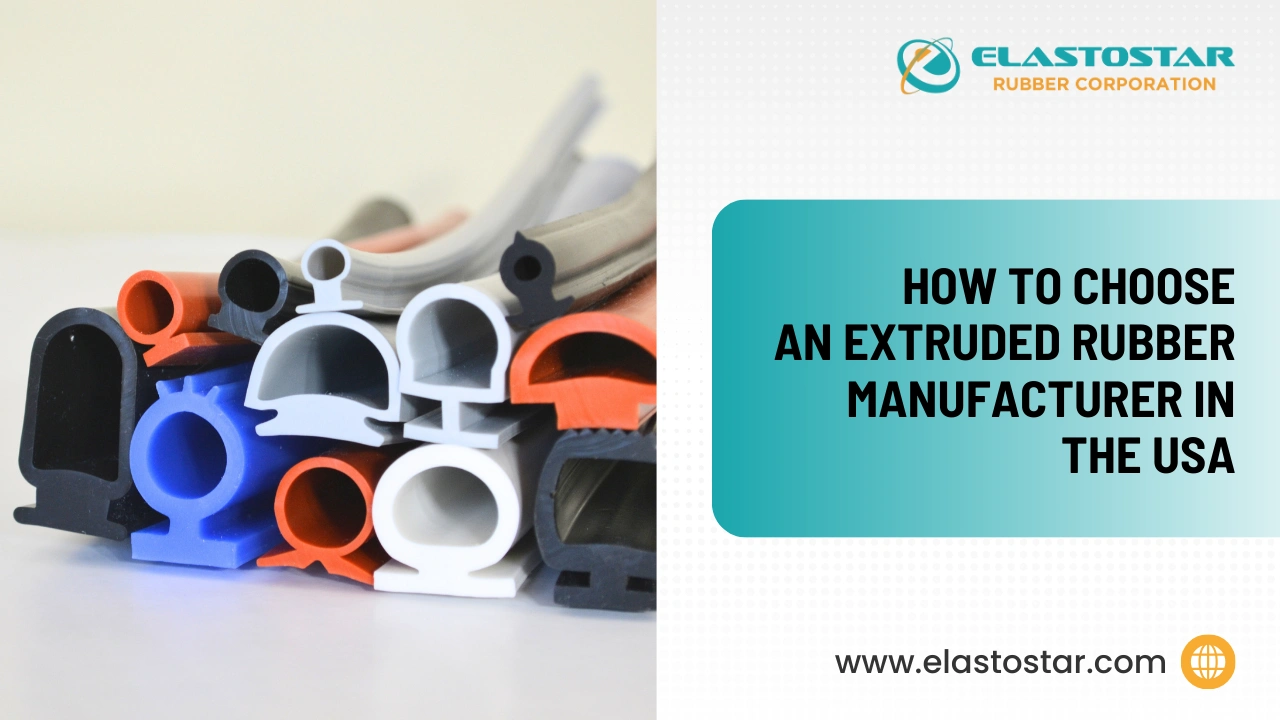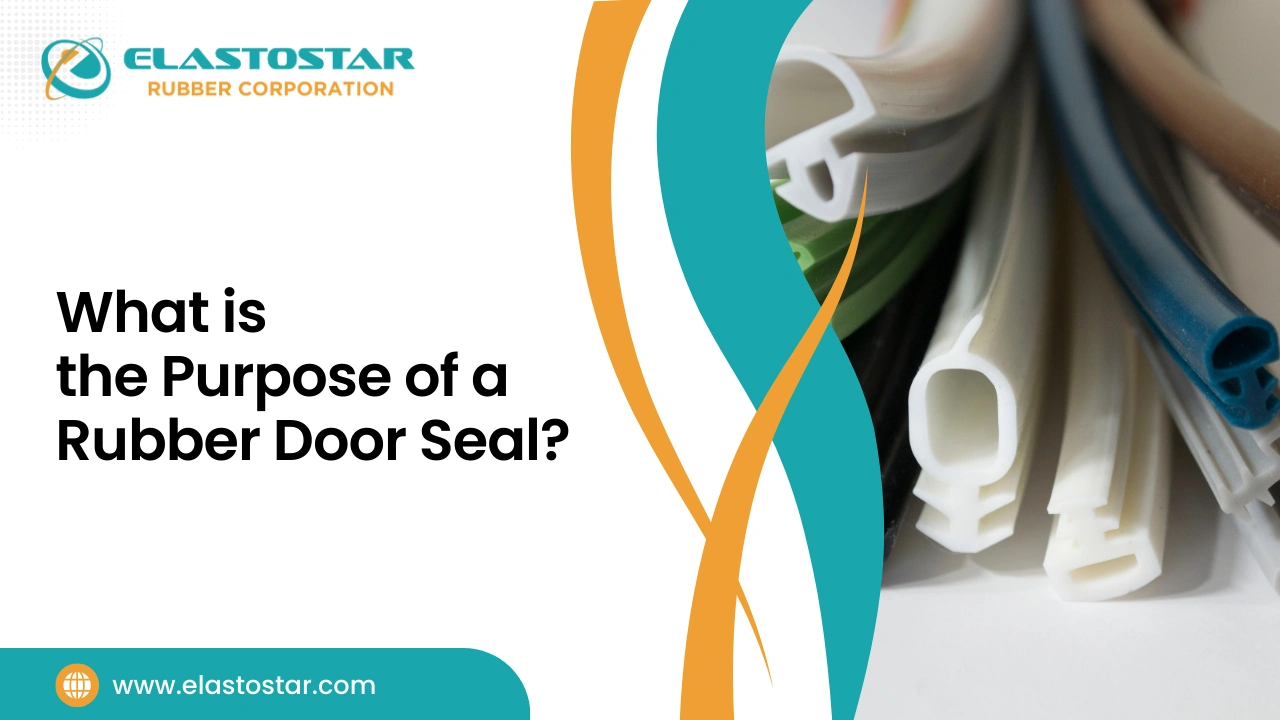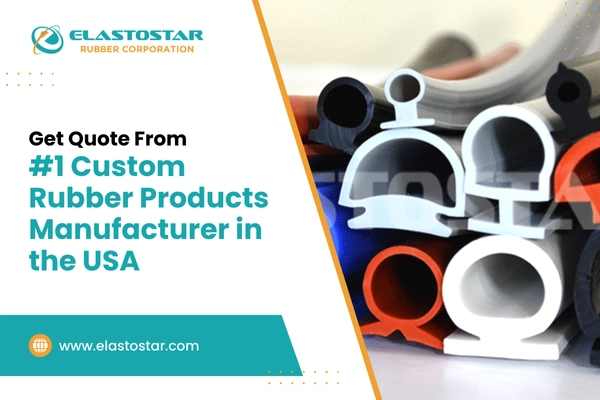Is food-grade silicone more durable than ordinary silicone? This question is necessary for industries where safety, performance, and longevity are non-negotiable. The right silicone material is compliant, efficient, and durable, from food processing industries to healthcare.
While food-grade and ordinary silicone is flexible and heat resistant, their composition, certifications, and lifespan vary significantly.
Choosing the wrong type can lead to faster wear, contamination risks, or regulatory issues. That’s why it is crucial to understand the benefits of FDA-approved rubber and its role in silicone rubber applications. This blog will uncover the differences to help you make the right choice.
What is Silicone? Composition, Properties & Uses
Silicone Rubber is a synthetic polymer made from silicon, oxygen, carbon, and hydrogen. It is widely known for its durability, flexibility, and resistance to extreme temperatures, making it a preferred material in industrial applications.
Unlike other rubbers, silicone remains stable under harsh conditions without degrading or losing its properties.
What are the Properties of Silicone?
Silicone is known for its exceptional properties, which make it ideal for various industrial and medical applications.
| Property | Description |
| Heat Resistance | Can tolerate extreme temperatures, from -60°C to 230°C without melting or breaking down. |
| Flexibility | Maintains elasticity and shape even after prolonged use. |
| Chemical Resistance | It resists oils, water, acids, and chemicals, making it ideal for food and medical applications. |
| Non-Toxic & Safe | It is free from harmful chemicals, making it suitable for food, medical, and baby products. |
| Waterproof | Provides excellent resistance to moisture and humidity. |
| Electrical Insulation | Used in electronics due to its non-conductive properties. |
| Durability | It does not crack, harden, or degrade over time, ensuring long-term performance. |
Common Uses of Silicone in Various Industries
Silicone’s unique properties make it useful in many industries, including
- Healthcare & Medical – Used in tubing, implants, and prosthetics.
- Automotive & Aerospace – Used in seals, gaskets, and insulation components.
- Electronics – Provides thermal insulation and waterproof coatings.
From silicone rubber materials in medical applications to silicone rubber products used in food processing, silicone plays a vital role in ensuring safety, durability, and performance across industries.
What is Food-Grade Silicone? Features & Safety Standards
Food-grade silicone is a high-purity silicone designed explicitly for safe contact with food, beverages, and medical applications.
It is made from non-toxic, BPA-free, and phthalate-free materials, it does not leach harmful chemicals into food or liquids.
Properties of Food-Grade Silicone
Food-grade silicone is non-toxic, BPA-free, heat-resistant, and does not react with food or beverages industries, making it safe in culinary and medical applications.
| Property | Description |
| Non-Toxic & Safe | Free from BPA, phthalates, and harmful fillers. |
| Heat Resistant | Handles temperatures ranging from -60°C to 230°C (-76°F to 446°F) without melting or degrading. |
| Odorless & Tasteless | Does not alter the taste or smell of food. |
| Non-Reactive | Does not interact with acids, oils, or other food substances. |
| Durable & Flexible | Resistant to cracking, drying, or degrading over time. |
| Waterproof & Hygienic | It prevents bacterial growth and is easy to clean. |
Read More – FDA Silicone: Meaning, Properties & Considerations
Certifications & Safety Standards for Food-Grade Silicone
To be classified as food-safe, silicone must comply with various certifications and regulatory standards
- FDA 21 CFR 177.2600 – Ensures silicone is safe for repeated food contact in the U.S.
- LFGB (Germany) – Requires additional strict testing for food safety.
- NSF (National Sanitation Foundation) – Certifies silicone for food and beverage industries.
- USP Class VI & USP Class VI Section 88 & 87 – Our materials are tested to meet high biocompatibility and toxicology standards, ensuring they are safe for medical and pharmaceutical use.
FDA silicone is rigorously tested for purity, durability, and resistance to heat and chemicals before being approved for direct food contact.
What are the Common Applications of Food-Grade Silicone?
Due to its safety, flexibility, and high resistance, food-grade silicone is widely used in
- Food Processing Equipment – Seals, gaskets, tubing, and conveyor belts.
- Medical & Pharmaceutical – Surgical instruments, tubing, and prosthetics.
What is Ordinary Silicone? Uses & Limitations
Ordinary or industrial-grade silicone is a flexible and heat-resistant material widely used in non-food applications.
It may contain fillers, dyes, or other additives that enhance its properties for industrial use but make it unsuitable for direct food or medical contact.
Composition & Additives in Ordinary Silicone
Ordinary silicone is composed of polymers mixed with various fillers to modify its properties. These fillers may include
- Plasticizers to improve flexibility.
- Colorants & Dyes for aesthetic or industrial marking purposes.
- Reinforcing Agents to increase strength and durability.
- Chemical Additives for resistance to UV, heat, and weathering.
Why It Matters: These added substances can leach out over time, making ordinary silicone unsuitable for applications requiring strict safety standards, such as food storage, baby products, and medical devices.
Common Uses of Ordinary Silicone in Non-Food Applications
Ordinary silicone is commonly used in industries where direct food contact is not required. Some applications include:
- Automotive Industry – Used in seals, gaskets, and hoses due to its heat and oil resistance.
- Construction & Building Materials – Found in sealants, adhesives, and waterproofing materials.
- Electronics & Electrical Insulation – Provides protective coatings and insulation for circuits.
- Industrial Machinery & Equipment – Used in vibration dampening, shock absorption, and flexible tubing.
Silicone rubber seal materials are often used in mechanical and industrial applications, while silicone rubber strips are used for padding, sealing, and insulation in machinery.
What are the Limitations & Potential Health Risks of Ordinary Silicone?
While ordinary silicone is versatile and durable, it has several limitations
| Limitation | Impact |
| Not FDA Approved | Plasticizers or other additives may be released over time. |
| Potential Chemical Leaching | May release plasticizers or other additives over time. |
| Less Purity | Contains fillers and unknown substances that can degrade faster. |
| Limited Safety Testing | Does not meet strict food or medical safety standards. |
Why It Matters: Using non-certified silicone in food-related or medical applications can pose health risks due to chemical contamination or poor durability.
Food-Grade vs. Ordinary Silicone: What Sets Them Apart?
When choosing between food-grade silicone and ordinary silicone, it’s important to understand their differences in composition, safety, durability, and applications.
1. Material Purity: Which One is Safer?
| Feature | Food-Grade Silicone | Ordinary Silicone |
| Composition | Made from pure silicone polymers, free from harmful additives. | May contain fillers, plasticizers, and dyes that can leach chemicals. |
| Toxicity | BPA-free, phthalate-free, toxin-free. | May release harmful substances over time. |
| Suitability | Safe for food contact, medical, and baby products. | Used mainly for industrial, automotive, and construction applications. |
Why It Matters: Food-grade silicone is designed to be non-toxic and safe, making it ideal for food storage and healthcare applications. In contrast, ordinary silicone can pose contamination risks if used in food-related products.
2. Certifications & Regulatory Compliance
Why It Matters: Certified food-grade silicone ensures safety and compliance in industries requiring strict health regulations. Ordinary silicone lacks certifications, meaning its quality and safety can vary significantly.
| Feature | Food-Grade Silicone | Ordinary Silicone |
|---|---|---|
| FDA Compliance | Meets FDA 21 CFR 177.2600 food safety standards. | Not FDA-approved for food contact. |
| International Certifications | Meets global food safety standards. | No specific global safety certifications. |
| Legal Requirement | Required for food processing, baby products, and medical use. | Mostly used in non-food industrial applications. |
3. Manufacturing Process: Quality Control & Testing
| Feature | Food-Grade Silicone | Ordinary Silicone |
| Quality Control | Undergoes strict testing and quality assurance. | Less strict manufacturing standards. |
| Purity Standards | Free from impurities, fillers, and contaminants. | May contain industrial additives for cost-cutting. |
| Testing | Passes USP Class VI Section 88 & 87 for biocompatibility. | No mandatory medical or food safety testing. |
Why It Matters: Food-grade silicone is extensively tested to maintain purity, safety, and durability, while ordinary silicone may contain contaminants that affect its performance and longevity.
4. Durability & Performance: Which One Lasts Longer?
| Feature | Food-Grade Silicone | Ordinary Silicone |
| Lifespan | Long-lasting, resists wear and tear. | More prone to cracking and drying over time. |
| Environmental Resistance | Withstands heat, cold, and moisture exposure. | Can degrade under extreme conditions. |
| Suitability for Repeated Use | Ideal for frequent washing, bending, and stretching. | Less durable for repeated use applications. |
Why It Matters: Food-grade silicone lasts longer and maintains its performance, making it the best choice for medical devices. Ordinary silicone may break down faster, reducing product life and potential safety concerns.
5. Heat & Chemical Resistance: Can They Handle Extreme Conditions?
| Feature | Food-Grade Silicone | Ordinary Silicone |
| Temperature Resistance | Bears -60°C to 230°C (-76°F to 446°F). | It may break down at lower temperatures. |
| Chemical Resistance | Non-reactive with oils, acids, and food-based chemicals. | It can degrade when exposed to harsh chemicals. |
| Hygiene & Safety | Does not absorb odors, flavors, or bacteria. | It may absorb substances over time, leading to contamination. |
Why It Matters: Food-grade silicone remains stable under extreme conditions, ensuring safety and durability in food and healthcare applications. Ordinary silicone may degrade faster, making it less reliable for sensitive environments.
Why is Food-Grade Silicone More Durable Than Ordinary Silicone?
Regarding durability, food-grade silicone outperforms ordinary silicone due to its higher resistance to wear, chemicals, and extreme temperatures.
This makes it ideal for long-term applications in industries that require reliability, safety, and compliance.
1. Resistance to Wear & Tear
- Food-Grade Silicone: Maintains its elasticity and structure even after repeated use.
- Ordinary Silicone: More prone to cracking, hardening, or losing flexibility over time.
2. Chemical Resistance & Safety
- Food-Grade Silicone: Non-reactive with oils, acids, and cleaning agents.
- Ordinary Silicone: Can absorb chemicals, leading to deterioration or contamination.
3. Heat & Temperature Endurance
- Food-grade silicone: Temperatures from -60°C to 230°C (-76°F to 446°F) without melting or breaking.
- Ordinary Silicone: Degrades faster when exposed to high temperatures.
4. Longevity & Long-Term Performance
- Food-Grade Silicone: Designed for years of use without degrading.
- Ordinary silicone: shorter lifespan and requires frequent replacement.
Why Choose Elastostar Rubber Corporation for Food-Grade Silicone?
Elastostar Rubber Corporation is a trusted leader in manufacturing FDA-certified silicone products designed for safety, durability, and high performance. We follow strict quality control measures, our materials meet food-grade and medical standards.
Need a custom solution? Contact us! Our custom silicone rubber parts are used in the food processing, healthcare, and manufacturing industries. We also provide FDA-approved gasket material, keeping products compliant with safety regulations.
We deliver high-quality, long-lasting products if you need seals, gaskets, tubing, or specialized silicone solutions.
Recommended Reads
- How to Differentiate Between Food-Grade FDA Silicone Rubber & Regular Silicone
- Which Is Better: Peroxide-Cured or Platinum-Cured Silicone Tubing?
- Medical-Grade Silicone: Meaning & Applications
Conclusion
Food-grade silicone is better for safety, durability, and long-term performance. Not like ordinary silicone, it is FDA-approved, free from harmful additives, and resistant to heat, chemicals, and wear. For food, medical, and baby products, choosing high-quality silicone prevents detecting silicone contamination issues, reliability, and compliance with safety standards.
FAQs
Is food-grade silicone durable?
Yes, food-grade silicone is highly durable. It resists heat, cold, chemicals, and wear, making it ideal for long-term use in food, medical, and baby products. it does not crack, harden, or break down over time. Elastostar Rubber Corporation offers high-quality, FDA-approved silicone designed for durability and performance.
What are the disadvantages of food-grade silicone?
While food-grade silicone is safe and durable, it may be more expensive than ordinary. It is also not biodegradable, meaning it doesn’t break down naturally. However, its long lifespan reduces waste compared to lower-quality materials. For custom silicone solutions, visit Elastostar Rubber Corporation.
Which silicone is stronger?
Food-grade silicone is stronger than ordinary silicone because it is pure, non-toxic, and free from weak fillers. It withstands higher temperatures, stretching, and daily use without degrading, making it more reliable for sensitive applications.
How do I know if my silicone sealant is food-grade?
Look for FDA-approved labels or certifications, such as LFGB, NSF, or USP Class VI, on the packaging. Food-grade silicone should be odorless, nontoxic, and free of chemical fillers. If unsure, contact Elastostar for certified silicone products.
Does food-grade silicone degrade over time?
No, food-grade silicone does not degrade quickly. It is resistant to moisture, UV exposure, and chemicals, ensuring long-term durability. However, excessive exposure to high heat or oils over many years may cause slight discoloration or wear.
Is food-grade silicone safe for repeated use?
Yes, food-grade silicone is designed for repeated use. It does not release harmful chemicals, even after multiple washes or exposure to extreme temperatures, making it perfect for kitchenware and food storage applications.




